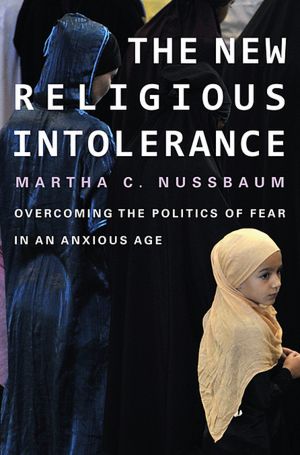 Presidential politics are everywhere these days, including the book pages. The Wall Street Journal reviews, here, The Eighteen-Day Running Mate: McGovern, Eagleton, and a Campaign in Crisis (Yale University Press), by Joshua M. Glasser, and Call Me Tom: The Life of Thomas F. Eagleton (University of Missouri Press), by James N. Giglio.
Presidential politics are everywhere these days, including the book pages. The Wall Street Journal reviews, here, The Eighteen-Day Running Mate: McGovern, Eagleton, and a Campaign in Crisis (Yale University Press), by Joshua M. Glasser, and Call Me Tom: The Life of Thomas F. Eagleton (University of Missouri Press), by James N. Giglio.The New York Times covers (here) The New Religious Intolerance: Overcoming the Politics of Fear in an Anxious Age (the Belknap Press/Harvard University Press), by law professor Martha C. Nussbaum. According to reviewer Damon Linker, the book "could serve as Exhibit A in liberalism’s defense against [the] charge" "that liberals in general, and Barack Obama in particular, prefer other forms of democracy (especially those that prevail in Europe) to the American way of life."
Also reviewed: Island of Vice: Theodore Roosevelt’s Doomed Quest to Clean Up Sin-Loving New York (Doubleday), by Richard Zacks (here); and two books about "the Tea Party Class of 2010" (here).
 Politics of a different sort: the readers of the History News Network have cast their votes, and the “the least credible history book in print”is . . . . find out here.
Politics of a different sort: the readers of the History News Network have cast their votes, and the “the least credible history book in print”is . . . . find out here.The New Republic: The Book is full of good stuff this week: Saul Austerlitz reviews, here, The Chinatown War: Chinese Los Angeles and the Massacre of 1871 (Oxford University Press), by Scott Zesch; Todd Gitlin reviews, here, After Broadcast News: Media Regimes, Democracy, and the New Information Environment (Cambridge University Press), by Bruce A. Williams and Michael X. Delli Carpini; and Michael Gorra reviews, here, Mrs. Robinson's Disgrace: The Private Diary of a Victorian Lady (Bloomsbury), by Kate Summerscale (also reviewed this week here, in the WSJ).
"Greed, lust, and the other seven deadlies never go out of fashion . . . ." Subscribers to the Chronicle of Higher Ed may read on here, where Peter Monaghan reviews Sin: The Early History of an Idea (Princeton University Press), Paula Fredriksen.
In the latest issue of the New York Review of Books, Ronald Dworkin reflects, here, on the Supreme Court's Affordable Care Act decision. Here's a taste:
Read on here.For centuries the most powerful and influential argument for social justice has been essentially an insurance-based argument. Justice within a political community requires that the most catastrophic risks of economic and social life be pooled. Everyone should be required to acquit his moral responsibilities to fellow citizens, as well as to guard against his own misfortune, by paying into a fund from which those who are in the end unlucky may draw. This conception of social insurance has been the rationale of the great social democracies of Europe and Canada, and taxation has been the traditional—indeed the only effective—means of pooling those risks. Insurance has been the rationale, in this country, of all our great welfare programs: Social Security, Medicare, Medicaid, federal disaster relief, among many others.The Affordable Care Act, out of assumed political necessity, is different—but only on the surface.